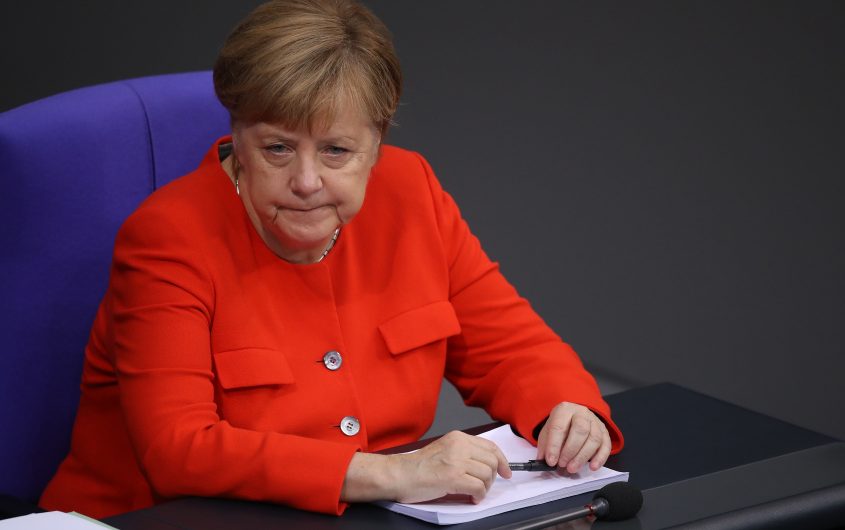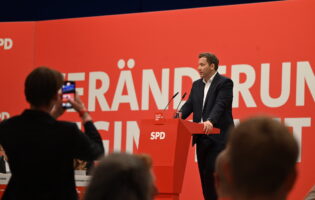
Sean Gallup/Getty Images
A Specter Is Haunting Europe

Elizabeth Pond
Elizabeth Pond is a Berlin-based journalist and the author of Beyond the Wall and The Rebirth of Europe.
The thirteen-year era of “Mutti” (“mama”) Angela Merkel just ended—not with a bang, but with a whimper.
Germany’s most beloved politician for a long decade was not voted out of office. Nor did the veteran chancellor succumb to a public backlash to her bold generosity in welcoming a million-plus refugees to Germany in 2015/16.
Instead, her aura of authority simply wafted away as a fellow conservative, her own interior minister Horst Seehofer, waged a one-man campaign against her—and as a little-known MP in her Christian Democratic Union (CDU) caucus in the Bundestag suddenly replaced a Merkel confidant as caucus leader this week in a secret ballot of 125 to 112.
A civil servant who has followed the melodrama closely but is not authorized to speak publicly about political affairs described the state of play. Merkel “has an Interior Minister in her Cabinet whom she cannot control, cannot discipline, and cannot get rid of,” he explained. “Nobody knows why” Seehofer is acting this way. He noted speculation that at the end of his political career, the 69-year-old Seehofer—who is the nominal party leader of the Bavarian Christian Social Union (CSU) as well as German interior minister—anticipates disastrous results in the regional election in Bavaria in October and has nothing left to his legacy but “to take her down with him.” In similar vein, Social Democrat MP René Röspel scorned Seehofer’s fixation as an “ego trip.”
Ego trip or not, Seehofer’s power to disrupt was exhibited twice in the past three months in crises he ignited by threatening to pull the CSU out of the current left-right “grand coalition” and thus bring down the government if he did not get his way in second-tier issues. His negative power was only confirmed by the surprise ouster of Merkel confidant Volker Kauder after his thirteen years as chief of the CDU-CSU joint parliamentary caucus of the sister conservative parties.
To be sure, Seehofer joined Merkel in urging Kauder’s reelection by the book. Yet new caucus leader Ralph Brinkhaus, a middle-of-the-road conservative rather than some mid-life rebel, profited from Seehofer’s dilution of the chancellor’s authority. At just the right point in this descending power curve Brinkhaus became the first rival to challenge the anointed conservative caucus leader in Germany in forty-five years. His colleagues admired his courage. He became the silent personification of discontent over Merkel’s tendency to make solo decisions without consulting her lieutenants. Yet his inoffensive profile meant that a secret vote for him waved no red flags in Merkel’s face.
He became the silent personification of discontent over Merkel’s tendency to make solo decisions without consulting her lieutenants.
Willy-nilly, then, Brinkhaus’s election became the de facto launch of the long-awaited counterrevolution to reverse, at long last, the modernizing shift to the center or even center-left she has effected in the CDU. It revealed the growing blame of Merkel, ever since last year’s general election, as a “polarizer” in party ranks—an image that directly contravenes Merkel’s reputation outside of Germany as an inveterate consensus builder.
So how did the revolt against Merkel and her emollient style reach critical mass so soon after she was still seen worldwide as the rock of European stability amid the populist waves—and even, unrealistically, as a potential successor to take over leadership of the West now that Washington has abdicated this role? How has the spontaneous “welcome culture” in which up to a million volunteers helped the refugees who poured into Germany in 2015/16 by teaching Syrian children German and showing rural Afghan wives how to shop in bewildering urban stores turned into today’s conservative counterrevolt in Germany? And why is the very new far-right Alternative for Germany (AfD) on the verge of embedding itself in German politics in a way that no previous far-right movement in post-World War II Germany ever managed to do?
The short political answer was presciently offered in an interview last July by Josef Janning. The head of the Berlin office of the European Council on Foreign Relations and mastermind of the definitive biannual mapping of cross-state European Union networks mused then about whether Merkel, like former chancellor Helmut Kohl, “would repeat the Kohl legacy and govern one term too many.”
The civil servant began a longer answer by pointing out that “the fundamentals haven’t changed. […] If you go back and study German attitudes toward immigration and asylum seekers over the past few years, most opinion polls suggest an almost even split in the German population. There is a broad 40 percent consensus that shares the welcome culture and an equal group that says no, the boat is full and we can’t take in any more refugees. And in the middle ground there is 20 percent that is not sure. […] So Merkel could preside above the fray of the [CDU] party.”
He acknowledged that the immigrant issue was not high on the list of public concerns going into the general election last September 24. “But it was an issue that sharply divides the German population and always has. You could say that half was for her and half was against her. But the problem is, the half that was behind her was not the classic conservative constituency. It was the Greens and part of the SPD internationalist and humanitarian wing and not the working class that in the past supported the SPD. At the polls the gap between her and her own party became apparent.”
He was referring to election results a year ago that gave the CDU/CSU bloc its lowest share of the vote since 1949 of 33 percent and the SPD its lowest share of 20.5 percent, while giving the new far-right AfD seats in the Bundestag for the first time, with 12.6 percent. The only way to form a stable government was a renewed grand coalition, with the combined majority of conservatives and Social Democrats in the Bundestag falling from 80 percent in the previous grand coalition to only 53 percent in the new one. By now opinion polls show that the AfD has reached a popularity of 18 percent to surpass a falling SPD at 17 percent.
With its fresh energy, the AfD has been gathering miscellaneous protest votes, poaching core supporters from the tired established parties, frightening traditional parties like the CSU into imitating its own xenophobia.
With its fresh energy, the AfD has been gathering miscellaneous protest votes, poaching core supporters from the tired established parties, frightening traditional parties like the CSU into imitating its own xenophobia, pushing back taboos against illegal Hitler salutes, and setting its own agenda of winning big in elections next spring in Germany’s eastern Länder that passed directly from Nazi authoritarianism to Communist authoritarianism before rejoining a democratic Germany in 1990.
All politics is local, of course. But the bad news is that as Merkel fades locally, Germany’s big-tent centrist “people’s parties” are fading with her and are now, belatedly, shrinking as visibly as those of their European partners.
A specter is haunting Europe and Germany—a dramatic erosion of trust in the centrist pragmatic consensus that after the slaughter of World War II brought the continent’s heartland its longest era of peace and prosperity in history.
Elizabeth Pond is a Berlin-based journalist and the author of Beyond the Wall and The Rebirth of Europe.









